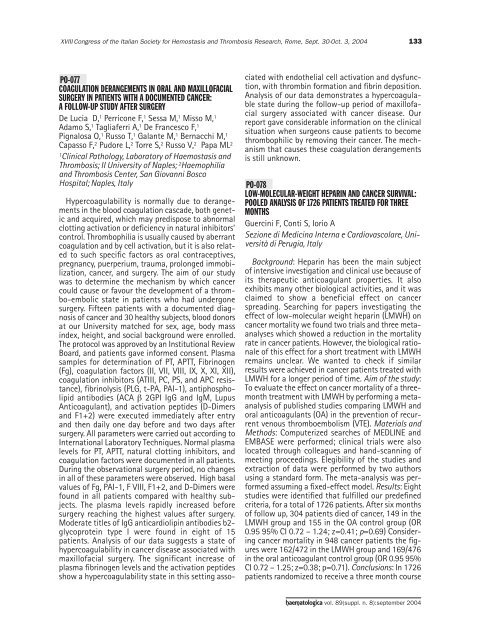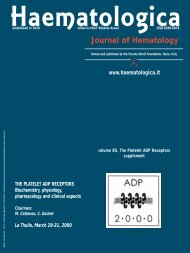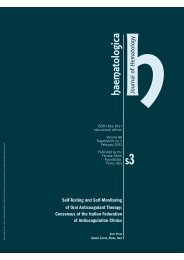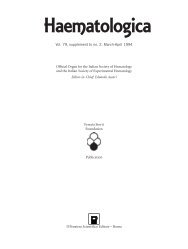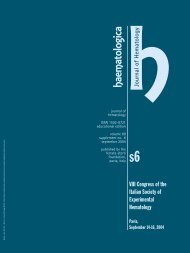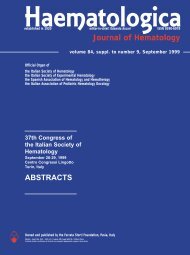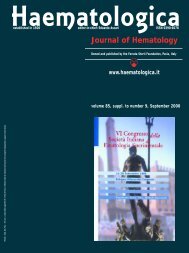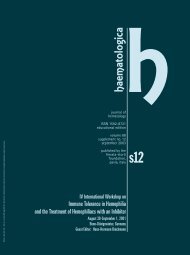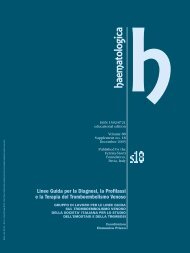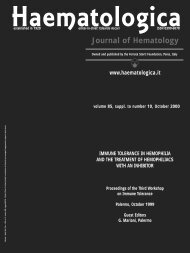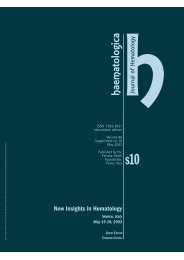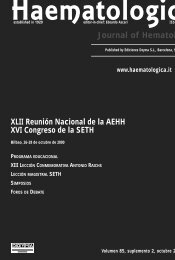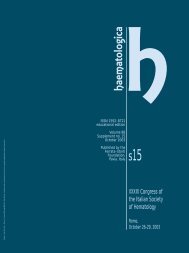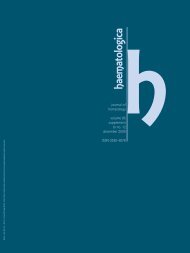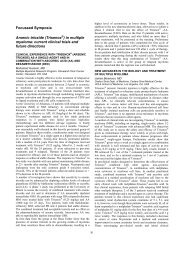Haematologica 2004;89: supplement no. 8 - Supplements ...
Haematologica 2004;89: supplement no. 8 - Supplements ...
Haematologica 2004;89: supplement no. 8 - Supplements ...
- No tags were found...
You also want an ePaper? Increase the reach of your titles
YUMPU automatically turns print PDFs into web optimized ePapers that Google loves.
XVIII Congress of the Italian Society for Hemostasis and Thrombosis Research, Rome, Sept. 30-Oct. 3, <strong>2004</strong>133PO-077COAGULATION DERANGEMENTS IN ORAL AND MAXILLOFACIALSURGERY IN PATIENTS WITH A DOCUMENTED CANCER:A FOLLOW-UP STUDY AFTER SURGERYDe Lucia D, 1 Perricone F, 1 Sessa M, 1 Misso M, 1Adamo S, 1 Tagliaferri A, 1 De Francesco F, 1Pignalosa O, 1 Russo T, 1 Galante M, 1 Bernacchi M, 1Capasso F, 2 Pudore L, 2 Torre S, 2 Russo V, 2 Papa ML 21Clinical Pathology, Laboratory of Haemostasis andThrombosis; II University of Naples; 2 Haemophiliaand Thrombosis Center, San Giovanni BoscoHospital; Naples, ItalyHypercoagulability is <strong>no</strong>rmally due to derangementsin the blood coagulation cascade, both geneticand acquired, which may predispose to ab<strong>no</strong>rmalclotting activation or deficiency in natural inhibitors’control. Thrombophilia is usually caused by aberrantcoagulation and by cell activation, but it is also relatedto such specific factors as oral contraceptives,pregnancy, puerperium, trauma, prolonged immobilization,cancer, and surgery. The aim of our studywas to determine the mechanism by which cancercould cause or favour the development of a thrombo-embolicstate in patients who had undergonesurgery. Fifteen patients with a documented diag<strong>no</strong>sisof cancer and 30 healthy subjects, blood do<strong>no</strong>rsat our University matched for sex, age, body massindex, height, and social background were enrolled.The protocol was approved by an Institutional ReviewBoard, and patients gave informed consent. Plasmasamples for determination of PT, APTT, Fibri<strong>no</strong>gen(Fg), coagulation factors (II, VII, VIII, IX, X, XI, XII),coagulation inhibitors (ATIII, PC, PS, and APC resistance),fibri<strong>no</strong>lysis (PLG, t-PA, PAI-1), antiphospholipidantibodies (ACA β 2GPI IgG and IgM, LupusAnticoagulant), and activation peptides (D-Dimersand F1+2) were executed immediately after entryand then daily one day before and two days aftersurgery. All parameters were carried out according toInternational Laboratory Techniques. Normal plasmalevels for PT, APTT, natural clotting inhibitors, andcoagulation factors were documented in all patients.During the observational surgery period, <strong>no</strong> changesin all of these parameters were observed. High basalvalues of Fg, PAI-1, F VIII, F1+2, and D-Dimers werefound in all patients compared with healthy subjects.The plasma levels rapidly increased beforesurgery reaching the highest values after surgery.Moderate titles of IgG anticardiolipin antibodies b2-glycoprotein type I were found in eight of 15patients. Analysis of our data suggests a state ofhypercoagulability in cancer disease associated withmaxillofacial surgery. The significant increase ofplasma fibri<strong>no</strong>gen levels and the activation peptidesshow a hypercoagulability state in this setting associatedwith endothelial cell activation and dysfunction,with thrombin formation and fibrin deposition.Analysis of our data demonstrates a hypercoagulablestate during the follow-up period of maxillofacialsurgery associated with cancer disease. Ourreport gave considerable information on the clinicalsituation when surgeons cause patients to becomethrombophilic by removing their cancer. The mechanismthat causes these coagulation derangementsis still unk<strong>no</strong>wn.PO-078LOW-MOLECULAR-WEIGHT HEPARIN AND CANCER SURVIVAL:POOLED ANALYSIS OF 1726 PATIENTS TREATED FOR THREEMONTHSGuercini F, Conti S, Iorio ASezione di Medicina Interna e Cardiovascolare, Universitàdi Perugia, ItalyBackground: Heparin has been the main subjectof intensive investigation and clinical use because ofits therapeutic anticoagulant properties. It alsoexhibits many other biological activities, and it wasclaimed to show a beneficial effect on cancerspreading. Searching for papers investigating theeffect of low-molecular weight heparin (LMWH) oncancer mortality we found two trials and three metaanalyseswhich showed a reduction in the mortalityrate in cancer patients. However, the biological rationaleof this effect for a short treatment with LMWHremains unclear. We wanted to check if similarresults were achieved in cancer patients treated withLMWH for a longer period of time. Aim of the study:To evaluate the effect on cancer mortality of a threemonthtreatment with LMWH by performing a metaanalysisof published studies comparing LMWH andoral anticoagulants (OA) in the prevention of recurrentve<strong>no</strong>us thromboembolism (VTE). Materials andMethods: Computerized searches of MEDLINE andEMBASE were performed; clinical trials were alsolocated through colleagues and hand-scanning ofmeeting proceedings. Elegibility of the studies andextraction of data were performed by two authorsusing a standard form. The meta-analysis was performedassuming a fixed-effect model. Results: Eightstudies were identified that fulfilled our predefinedcriteria, for a total of 1726 patients. After six monthsof follow up, 304 patients died of cancer, 149 in theLMWH group and 155 in the OA control group (OR0.95 95% CI 0.72 – 1.24; z=0.41; p=0.69) Consideringcancer mortality in 948 cancer patients the figureswere 162/472 in the LMWH group and 169/476in the oral anticoagulant control group (OR 0.95 95%CI 0.72 – 1.25; z=0.38; p=0.71). Conclusions: In 1726patients randomized to receive a three month coursehaematologica vol. <strong>89</strong>(suppl. n. 8):september <strong>2004</strong>


